Vietnamese clothing is a vibrant and unique expression of the country’s rich cultural heritage. From the traditional Ao Dai dress to the modern and colorful street fashion, Vietnamese clothing has something to offer everyone.
Whether you’re a traveler looking for a unique souvenir or a fashionista wanting to explore the latest trends, you’ll find a wide variety of items to choose from. With its long history of craftsmanship and innovation, Vietnamese clothing will surely be a hit with all who appreciate the beauty of traditional clothing and modern fashion.
Get ready to explore the exciting world of Vietnamese clothing and discover why it’s become one of the most popular destinations for fashion lovers.
See more: Discover Vibrant Vietnamese Culture on Your Adventure
Ao Dai: The Iconic Vietnamese Dress
The Ao Dai, a traditional Vietnamese dress, has a long and storied history dating back to the 17th century. As the national costume of Vietnam, it is a beloved symbol of Vietnamese culture that is often worn by both men and women on special occasions.
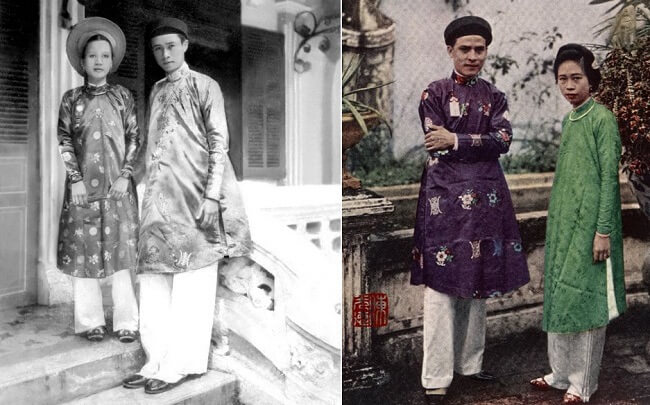
This long tunic dress is characterized by a high, open collar and two panels of fabric that are fitted at the waist and hips. Made primarily from silk, the dress is typically adorned with intricate details such as embroidery, lace, and beading and is available in a wide range of bright, vibrant colors. Variations of the Ao Dai can be found throughout Vietnam, with each region incorporating its own unique style and influences.
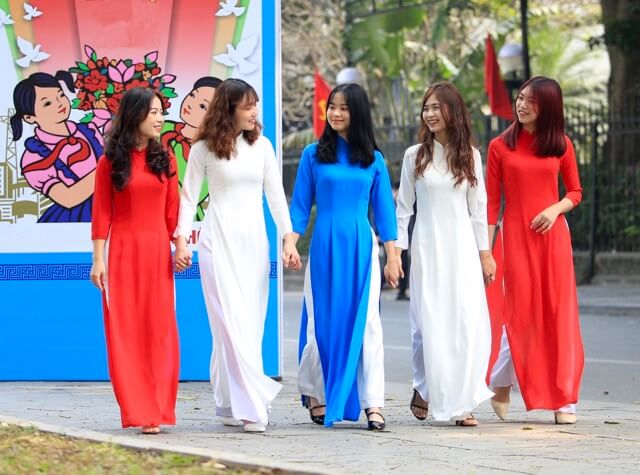
Cultural events, weddings, traditional dance performances, and festivals are just a few of the occasions where the Ao Dai is prominently featured. For those interested in purchasing a souvenir, many expert tailors in Vietnam specialize in creating custom-made Ao Dai tailored to individual measurements.
The Ao Dai is a beautiful garment and a way for Vietnamese people to express their culture and pride. Travelers to Vietnam can witness the beauty of the Ao Dai firsthand and gain a deeper appreciation for the country’s rich cultural heritage.
Besides ao dai and pho, Vietnamese coffee is famous for its rich, unique flavor that any tourist should not miss.
Beyond the Ao Dai: Exploring Other Traditional Garments
Vietnamese clothing is a reflection of the country’s rich history and culture, and there are many beautiful and unique traditional garments to explore beyond the well-known Ao Dai.
One of these garments is the Ao Ba Ba, which is widely popular among Vietnamese women. This tunic features a mandarin collar with two side slits and buttons down the front, giving it a distinctive look. The fabric of the Ao Ba Ba varies from silk to linen, making it a comfortable and versatile garment that can be worn in different seasons.
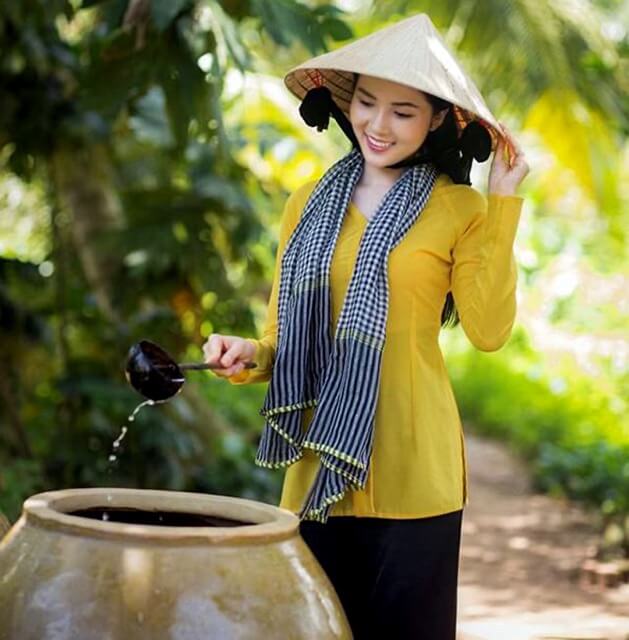
In addition to the Ao Ba Ba, regional costumes are also a popular choice in Vietnamese fashion. The Cham ethnic group, for example, has its own distinctive brocade clothing that is made of silk and decorated with vibrant colors and intricate patterns. These garments are often worn for special occasions and ceremonies, such as weddings and festivals, and offer tourists a unique way to experience Vietnamese culture.
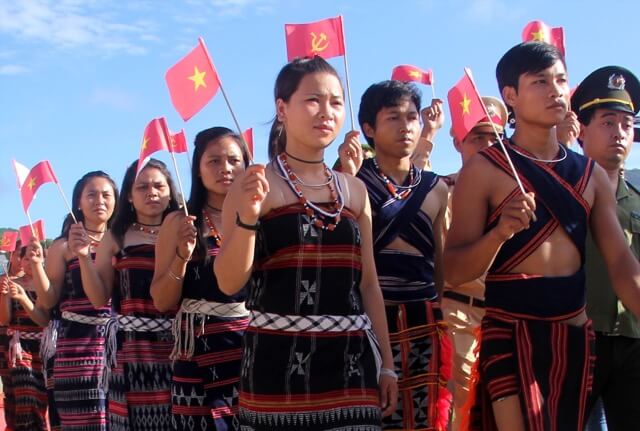
There is a wide variety of traditional Vietnamese clothing to explore, from the Ao Ba Ba to the Cham ethnic group’s brocade clothing. Whether you are searching for a souvenir or want to immerse yourself in a different culture, these garments will surely make your trip to Vietnam unforgettable.
Tourists can find traditional clothing in a variety of places, including markets and boutiques. The vibrant markets in Ho Chi Minh City and Hanoi offer a wide selection of traditional clothing, including ao dai, ao ba ba, and other regional costumes. For a more tailored experience, tourists can visit boutiques, particularly in Ho Chi Minh City, where they can choose from a variety of intricate designs and quality craftsmanship, including intricate embroidery and unique designs.
With so many beautiful and unique garments to discover, tourists are sure to find something that captures their interest and makes their trip to Vietnam truly unforgettable.
Excited for your adventure in Vietnam? Let’s dive into the tradition of tipping in Vietnam to ensure your journey is smooth sailing from start to finish!
Conical Hat: A Distinctive Vietnamese Headwear
Vietnamese clothing is known for its unique blend of traditional and modern styles.
Among the many traditional pieces of clothing, the Non La, or conical hat, stands out for its beauty and cultural significance. The Non La is a traditional Vietnamese hat that has become iconic in Vietnamese culture, made from materials such as bamboo or palm leaves. It has been worn by farmers and fishermen for centuries and is believed to have originated from ancient Vietnamese people.

The Non La serves the practical purpose of protecting the wearer from the sun and rain and symbolizes the Vietnamese people’s hard work and dedication. Farmers and laborers typically wear it in the fields, and it has become a popular fashion statement among tourists, who can find a variety of Non La in different colors and styles, making it a great souvenir to bring back home.
Craft villages are the best place to find Non La in Vietnam. Artisans still practice traditional techniques for weaving and shaping hats. Visitors can witness the process of making Non La, from preparing the raw materials to crafting the final product. Additionally, souvenir shops are also a great place to purchase a Non La as a souvenir to take home.

Each Non La is a work of art crafted with attention to detail and skill. The woven patterns and unique shape of each hat are a testament to the cultural heritage of Vietnam, and the craftsmanship that goes into each Non La is a reminder of the Vietnamese people’s pride in their traditions.
The Non La is a distinctive and culturally significant piece of Vietnamese headwear. It is both practical and beautiful, serving a practical purpose while also symbolizing the hard work and dedication of the Vietnamese people. Visitors to Vietnam can witness the traditional techniques used to craft Non La in craft villages and take home a beautiful souvenir that serves as a reminder of the country’s rich cultural heritage.
Vietnamese Shirt and Traditional Dress Names
Vietnamese clothing is a rich and diverse reflection of the country’s cultural heritage, encompassing a variety of styles, each with its own unique symbolism and significance. Among the most iconic pieces of traditional clothing are the Yem and Áo Tứ Thân.
The Yem, a type of shirt that originated in northern Vietnam during the 16th century, is typically made of silk and features intricate embroidery. The embroidery often depicts flowers, birds, and other natural elements in a contrasting color, such as gold or silver, creating a stunning effect.
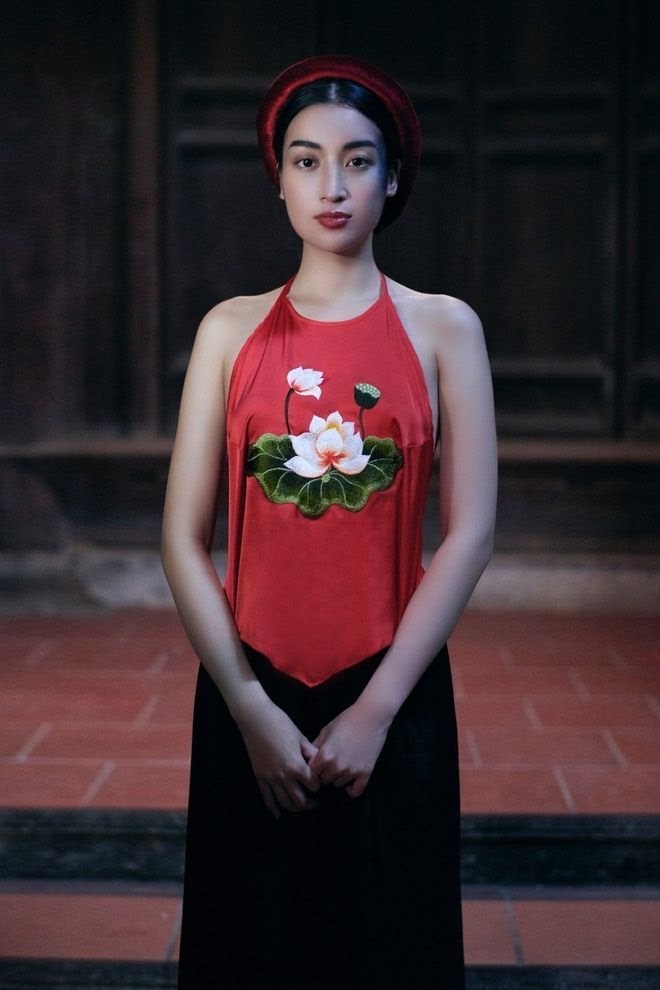
The Áo Tứ Thân, or “four-part dress,” is a traditional Vietnamese dress worn by both men and women. The dress is made up of four parts:
- A long flowing robe
- A long-sleeved tunic
- A wrap-around skirt
- A turban or headscarf

Made of cotton, the Áo Tứ Thân features intricate patterns, such as the Phoenix and Dragon pattern, which symbolize good fortune and prosperity. The Áo Tứ Thân is typically worn for special occasions like weddings and festivals, symbolizing tradition and cultural heritage.
Both the Yem and Áo Tứ Thân are popular souvenirs for travelers, available in souvenir shops and markets throughout the country. Many visitors appreciate the opportunity to purchase traditional clothing that represents Vietnam’s rich cultural heritage. These garments are a testament to the country’s history and cultural traditions, serving as a reminder of the Vietnamese people’s pride in their heritage.
Vietnamese clothing is a beautiful representation of the country’s culture and heritage, with the Yem and Áo Tứ Thân being two of the most iconic pieces of traditional clothing. These garments showcase the country’s rich history and cultural traditions, as well as the Vietnamese people’s pride in their heritage.
Immerse yourself in the fascinating history of Hoa Lu, Vietnam, the inaugural capital of Vietnam and birthplace of national hero Dinh Bo Linh. Though no longer the political hub, this ancient site remains a treasure trove of temples, mausoleums, and more, preserving its rich heritage for curious travelers.
Conclusion
Vietnamese clothing is a beautiful and unique expression of the country’s culture and history. Traditional Vietnamese garments are a must-have souvenir for travelers, from the iconic Ao Dai to the distinctive Conical Hat.
With the help of this guide, travelers can now easily explore the history and fashion of Vietnamese clothing. Whether you’re looking for a classic Ao Dai or a unique traditional dress, you can now find the perfect piece to take back home with you. So go ahead and unleash the beauty of Vietnamese clothing!


Related Posts
Vietnam Motorbike Adventures: The Ultimate Guide
With its breathtaking landscapes, rich cultural heritage, and vibrant local experiences, Vietnam offers an unforgettable adventure for motorbike enthusiasts. Discover hidden gems, meet friendly locals, and create lasting memories as you explore diverse terrains and immerse yourself in the heart of Vietnam. Why Choose a Motorbike Adventure in Vietnam? Freedom and Flexibility If you love […]
Experience the Living Conditions in Cu Chi Tunnels: Unbelievable!
Cu Chi Tunnels served as the living quarters for soldiers and civilians during Vietnam’s resistance against France and America. Today, this remarkable site stands as a symbol of perseverance, determination, and resilience during one of the most challenging periods in Vietnamese history. Discover the living conditions in Cu Chi Tunnels with Joy Journeys in the […]
Vietnam Fish Cake: A Culinary Delight
Vietnam fish cake, known for its delicious and diverse flavors, is a favorite among tourists looking to explore authentic Vietnamese cuisine. From the crispy, golden-brown texture of fried fish cakes to the fragrant, herb-infused variations found in regional specialties, these savory delights offer a true taste of Vietnam. In this article, we will take you […]